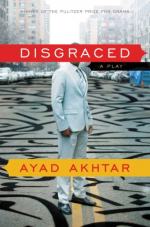
|
| Name: _________________________ | Period: ___________________ |
This test consists of 15 multiple choice questions and 5 short answer questions.
Multiple Choice Questions
1. How is Abe’s wardrobe different when he enters in Scene Four than it was when he entered in Scene One?
(a) More neutral.
(b) More muted.
(c) More Americanized.
(d) More colorful.
2. In Scene Three, when discussing art, what does Emily say Islam is still connected to?
(a) The earth.
(b) The divine.
(c) A less personal perspective.
(d) Its roots in primitive religion.
3. What is the immediate cause that leads Amir to hit Emily?
(a) She condemns him for his failure to be promoted.
(b) She taunts him for being an alcoholic nobody.
(c) She threatens to leave him if he is fired.
(d) She confesses to her affair with Isaac.
4. What does Emily say Amir is, when he says he is her personal Moor?
(a) She says he is her inspiration.
(b) She says he is her angel.
(c) She says he is her slave.
(d) She says he is her muse.
5. What does Amir say he is, now that he has renounced his faith?
(a) An infidel.
(b) A heathen.
(c) An apostate.
(d) A pagan.
6. What is Amir’s approach to airline security?
(a) He wears his most expensive clothes.
(b) He does not fly.
(c) He offers himself to be searched.
(d) He makes eye contact and reassuring glances at security.
7. What does Amir say about Emily approaching him the way she does in Scene Three?
(a) That he sees how she loves him.
(b) That it is just a matter of time till he feels better.
(c) That he is still too on edge from work.
(d) That it does not help.
8. What does Emily say about her Islamic-influenced work?
(a) It was a failure.
(b) It was naïve.
(c) It was propaganda for a failed ideology.
(d) It was dangerous.
9. When does Emily say western art turned away from things that are bigger than themselves, to focus on individualism?
(a) Modernism.
(b) The Enlightenment.
(c) The early industrial era.
(d) The Renaissance.
10. How does Isaac want to present Emily’s approach to Islam?
(a) As not traditional, but not alienated either.
(b) As not afraid, but not self-deceiving.
(c) As not believing, but faithful.
(d) As not ironic, but in service.
11. How does the stage direction say Emily approaches Amir in Scene Three?
(a) Softly.
(b) Boldly.
(c) Maternally.
(d) Sexually.
12. What idea does Isaac want to hold out as a unifying concept humanity can rally around?
(a) Equality under the law.
(b) Justice.
(c) Peace and love.
(d) The good life.
13. What is Jory’s race?
(a) Latina.
(b) Caucasian.
(c) Asian-American.
(d) African-American.
14. Why does Amir say he changed his name?
(a) Immigration to the U.S.
(b) Identity theft.
(c) Entering practice.
(d) His first marriage.
15. What punishment does Amir say the Quran specifies for people like him, who have renounced their faith?
(a) Exile.
(b) Imprisonment.
(c) Beheading.
(d) Death.
Short Answer Questions
1. Which of the characters has the quote “if faced with choosing justice or order, I’ll always choose order” (59) taped above a workspace?
2. What is broken at the beginning of Scene Three?
3. How does the playwright say this thing breaking at the beginning of Scene Three makes Amir feel?
4. What does Emily send Amir out for, after calling him into the kitchen to get him to tone down his rhetoric?
5. How does Emily combat her husband’s disdain for Islam?
|
This section contains 546 words (approx. 2 pages at 300 words per page) |

|




